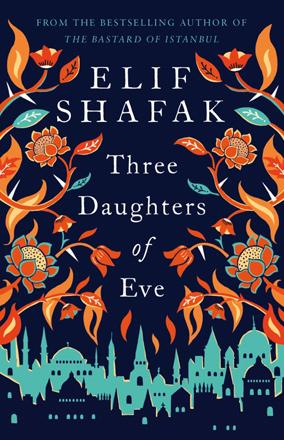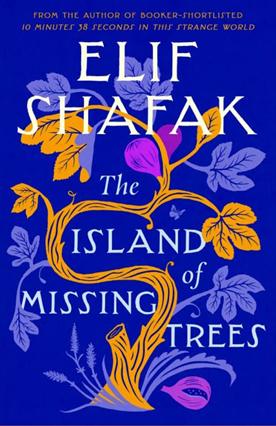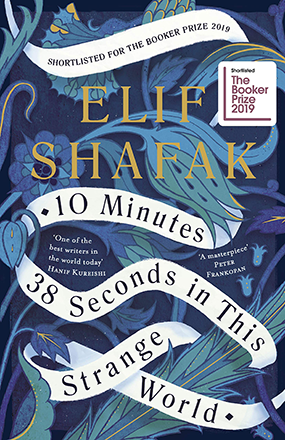You are here
Searching for a new language
By Sally Bland - Jun 11,2018 - Last updated at Jun 11,2018

Three Daughters of Eve
Elif Shafak
UK: Viking/Penguin Random House, 2016
Pp. 367
Though filled with drama, passion, love and betrayal, “Three Daughters of Eve” is essentially a novel of ideas. The main character, Peri, is tormented by the dilemmas facing modern Turkey, chiefly tension between the secularism upon which the republic was founded, and the growing religiosity of society at large.
Around this main theme, author Elif Shafak weaves commentary on numerous other subjects: feminism, class differences, the after-effects of 9/11, the relation of state power to religion and wealth, and Istanbul’s urban problems.
Peri first appears as a well-adjusted, 35-year-old wife and mother. But a bizarre event, as she is driving to meet her husband at a party, disrupts her complacency. “A crack had appeared in the dam she had erected over the years to block the flow of unwanted emotions into her heart.” (p. 148)
“Random memories, repressed anxieties, untold secrets, and guilt, plenty of guilt” came flooding back. (p. 44)
The novel traces these memories, and why they are so traumatic, by shuttling between 1980s Turkey, when Peri was growing up, to Oxford where she studied in 2000-2002, and now-time in Istanbul 2016. Her father being an adamant secularist and her mother a very devout Muslim, their home was the scene of constant discord, and Peri was always caught in the middle. She identified more closely with her father, who was not an atheist, but decried the suppression of free thinking, saying: “In the name of religion they are killing God. For the sake of discipline and authority, they forget love.” (p. 87)
Peri’s uncertainty increased after her brother was arrested for his leftist activities in the aftermath of the 1980 military coup; the family further unravelled, and a deep sadness settled in their home. Peri began to quarrel with God, mainly because she couldn’t understand why he allowed such injustice in the world. At her father’s suggestion, she began to keep a diary of her thoughts on God.
When Peri has the chance to study at Oxford, she broadens her intellectual horizons, but her obsession with studying keeps her socially isolated except for her close friendship with two other women: the daring, unorthodox, Iranian-origin Sherin, and Mona, an Egyptian American, who is as committed to political and social cause, as she is to being a devout Muslim and wearing hijab. With Peri still uncertain about spiritual matters, they become a trio of unlikely friends, dubbed “the Sinner, the Believer and the Confused”. Shafak uses this trio to explore the divergent ways of thinking and life styles that can evolve among those of Muslim background.
At Shirin’s urging, Peri signs up for a philosophy seminar on God, taught by the charismatic Professor Azur, which is not so much about God as about how philosophers have thought about God over the ages, and how people can discuss their disagreements on the subject in a constructive way, without animosity. This should have been the perfect continuation of the quest Peri had started with her God diary, but still answers elude her.
While at Oxford, she writes: “Is there really no other way, no other space for things that fall under neither belief or disbelief — neither pure religion nor pure reason? A third path for people such as me? For those of us who find dualities too rigid and don’t want to conform to them?... It is as if I’m searching for a new language.” (p. 57)
Peri’s quest to define her identity and her relationship to God is to have unforeseen consequences. While her quest appears as a metaphor for the trajectory of modern Turkey, she is never reduced to a mere symbol. Her life is governed as much by random events, personal feelings and choices, and unexpected human behaviour, as by her spiritual quest. The plot is as messy as real life can be, with some characters’ motives remaining ambiguous and contradictory. Via Peri’s uncertainty and traumas, Shafak seems to be arguing for the acceptance of multiple forms of spirituality, free of dogma — a theme which often appears in her writing. In this sense, the implications of the story are not limited to Turkey.
Peri’s love of words, books and learning is a recurring theme in the book. To her, “Books were liberating, full of life. She preferred being in Storyland to being in her motherland.” (p. 71)
One feels this aspect of Peri mirrors the author herself. The many philosophical references included in the story attest that Shafak has read widely and deeply.
“Three Daughters of Eve” is very readable due Shafak’s wonderfully flowing prose, her vivid imagination, out-of-the-box perceptions and adept handling of burning questions. Her words are tactile and sensuous, whether describing the weather in Britain, Peri’s interior world or the chaos of Istanbul’s streets. She constructs her plot cleverly, sowing hints about the past, but one doesn’t know the source of Peri’s guilt until the very end. “Three Daughters of Eve” is available at Books@cafe.
Related Articles
The Architect’s ApprenticeElif ShafakNew York: Penguin Books, 2014Pp.
The Island of Missing TreesElif ShafakUK: Viking/Penguin Random House, 2021Pp.
10 Minutes 38 Seconds in This Strange WorldElif ShafakLondon: Viking/Penguin Random House: 2019Pp.


















